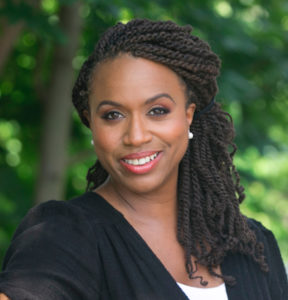
Finding Inspiration and Sharing Hope for the New Congress
A Conversation with Representative Ayanna Pressley
Before Congresswoman Ayanna Pressley (MA-07) was sworn into the 116th Congress, we spoke with her about her hopes and expectations for the upcoming session. We look forward to the leadership Representative Pressley and other new members of Congress bring to Capitol Hill to advance policies that mend the gaps in our nation.
Connection: What are you looking forward to working on when the new Congress begins?
 Representative Pressley: I intend to be an activist leader on all issues of consequence to the people I represent. People don’t live in checked boxes, they live in intersectionality, and are impacted by many different policies. During my campaign, I developed—in partnership with community—a wide ranging Equity Agenda, focused on addressing the persistent disparities in Massachusetts’ 7th District. One of the issues I called out was the epidemic of gun violence and trauma—I intend to make that a priority, and have already secured commitments from Democratic leadership to bring common sense gun control to the floor of the House, but I will also be a leader on issues like healthcare, environmental justice, and transportation equity—all of which are critical to my constituents.
Representative Pressley: I intend to be an activist leader on all issues of consequence to the people I represent. People don’t live in checked boxes, they live in intersectionality, and are impacted by many different policies. During my campaign, I developed—in partnership with community—a wide ranging Equity Agenda, focused on addressing the persistent disparities in Massachusetts’ 7th District. One of the issues I called out was the epidemic of gun violence and trauma—I intend to make that a priority, and have already secured commitments from Democratic leadership to bring common sense gun control to the floor of the House, but I will also be a leader on issues like healthcare, environmental justice, and transportation equity—all of which are critical to my constituents.
Connection: How does your faith inspire your work as an elected official?
Rep. Pressley: I’m often asked about my political education, and while people tend to focus on the time I spent working for Congressman Joseph P. Kennedy II and Senator John Kerry, the truth is that the values that have informed my work as an elected official first took root as a child, when I attended Rain or Shine Baptist Church in Chicago, where my grandfather, Rev. James Echols, was the pastor. The values of inclusive leadership, empathy, and compassion, which are a through-line of my career in elected office, were first introduced to me in the Church, and I continue to carry them with me today as a woman of abiding faith.
Connection: How have you seen policies you’ve promoted in the past positively affect your constituents and our nation?
 Rep. Pressley: One story that I believe is emblematic: when I ran for the Boston City Council, I ran on a platform of elevating the voices of women and girls. Sitting in my first school budget hearing after I was elected, I asked every department head who came before us how they policies they were proposing would impact girls—their answers were sparse at best. Now, eight years later, those department heads come to our budget hearings with binders full of information on how their policies will affect female students, about teen pregnancy, and push-out, and the school to prison pipeline. This progress only happened because someone asked the question. We must continue to ask the difficult questions that will lead to real progress.
Rep. Pressley: One story that I believe is emblematic: when I ran for the Boston City Council, I ran on a platform of elevating the voices of women and girls. Sitting in my first school budget hearing after I was elected, I asked every department head who came before us how they policies they were proposing would impact girls—their answers were sparse at best. Now, eight years later, those department heads come to our budget hearings with binders full of information on how their policies will affect female students, about teen pregnancy, and push-out, and the school to prison pipeline. This progress only happened because someone asked the question. We must continue to ask the difficult questions that will lead to real progress.
Connection: When times are difficult, what keeps you motivated to continue working for the common good?
Rep. Pressley: I often begin my days with a verse from a book called The President’s Devotionals, by Joshua DuBois, which helps motivate me during more challenging times. One of my favorite affirmations from this book is entitled “a Gentle Battle.” To paraphrase, it says that each morning we awake to a gentle battle. Of all the negotiations and decisions of our day, this gentle battle is the most important. Will we go in the direction of worry, weariness, and indifference—or in the direction of joy, of peace, of equality and justice? Even through the most difficult times, I remain committed to the latter.
Connection: Do you have any advice for advocates inspired by their faith to engage in politics?
Rep. Pressley: I would say, simply, “do it”—our Democracy needs your voices. For our government to be truly representative, we need a diversity of passionate, committed voices around the table. If we want to see values like compassion, dignity, and social justice reflected in our public policy, then we need to invest the sweat equity necessary to elect activist leaders and hold them accountable. Change can’t wait, but it also won’t happen on its own; we need to work to create it.
***
This story originally appeared in the January 2019 issue of Connection Magazine. Read the full issue here.







